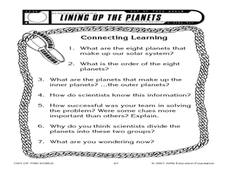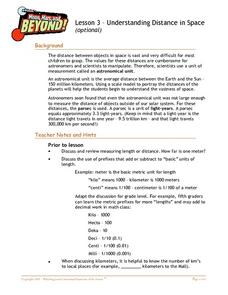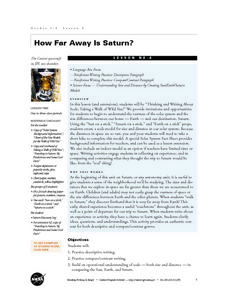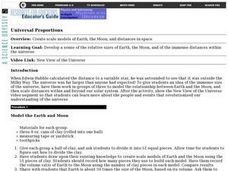Curated OER
PLANETS IN PROPORTION
Students discover scales for both the solar bodies' relative sizes and their distances from the sun. They find equatorial circumference and volumes of their solar bodies. Students apply estimation strategies and proportioanl reasoning to...
Curated OER
Determining distance between planets and the Sun
Students use a model to determine the distance between the sun and plants in our solar system. They determine a scale to use that represents the distance between the Earth and sun. Students calculate the scale distance that each planet...
Journey Through the Universe
Going through a Phase
Ignore the full moon, it's just a phase. Young scholars observe and record the moon during a full cycle before learning to predict future phases. Then the instructor leads a discussion on the other solar system objects that also go...
Curated OER
Map Your House
Students are introduced to the concepts of maps as scale models of the whole. After a brief lecture on creating and using an accurate scale when drawing and reading a map. They create a scale drawing of the floorplan of their homes.
Curated OER
Scale Basketball
Students understand that a spreadsheet can be used to find the best scale to use in a model. They place the distances of the planets of the solar system to the Sun in one column of the spreadsheet. Students try different scales so that...
Curated OER
The Beaufort Scale: A Local Model
Students study the Beaufort Scale and use it to study wind in their community. In this wind study lesson, students watch a DVD about climate change and learn about the Beaufort Scale. Students complete a worksheet for the topic.
Curated OER
Exploring Mars
Students, working in small groups construct scale models of the planets and solar system. They examine images of Mars and discuss what might have caused the features. They record facts about their planetary research in their journals and...
Curated OER
The Ellipse
This is a practical sheet with the instructions to draw a set of ellipses. After following the diagrams, there are ten questions to complete, with calculations expected for alternate orbits and comparisons related to actual planets in...
Curated OER
Clay Planets
Students create scale models of the planets out of clay and compare them to the real planets.
Curated OER
Lining up the planets
Pupils follow cue cards in order to order the planets in the correct order in the solar system. In this planets lesson plan, students work in groups to make a 2D model of the planets.
Curated OER
Understanding Distance in Space
Students discover the vocabulary used for distances in space and review measurement units and instruments before creating a scale model of the planets. They determine how to calculate the relative distances between the planets using a...
Curated OER
A View Of Home From The Front Door and From Space
Students discover how distance can change how our view of an object. Students build a representative model of where their home is located from different distances. They create three drawn models of their home from various elevations as...
Space Awareness
History of the Universe
Your pupils may believe that you and their parents are the oldest things in the universe, but surprise! There are elements of the universe that are even older. Elementary scientists create a class timeline to demonstrate the expansive...
Curated OER
3D Textured Globe
The earth, our home planet, and the star of Earth Day celebrations everywhere! Celebrate Earth Day or examine Earth's place in the solar system, with a fun and easy craft, perfect for children nine and up. Paper mache ornaments, paint,...
Star Date
Build Your Own Galaxy
Don't just look at pictures of the Milky Way galaxy, build it with this hands-on activity in which scientists recreate the galaxy we live in.
Curated OER
Motion of the Sun and Earth: Using a Classroom Model to Explore Rotation and Revolution
Students use a concrete model of the Sun and Earth to observe and manipulate a 3-D model of the Sun and Earth.
Curated OER
Cosmic Wheels
Students build a scale model of the Solar System and determine the time other planets take to travel around the Sun in comparison to the time of the Earth's revolution. The velocity of the planets are also determined in this...
Curated OER
Walk a Mile in your Orbit
Middle schoolers create an awareness of the distance between the planets and the complexity of the solar system through a model of an active solar system. they incorporate physical education and math with the ability to convert distances...
Curated OER
Distance in Space
Sixth graders explore space science by measuring distances between planets. In this solar system lesson, 6th graders view a Bill Nye video and discover the conversion between the metric system and imperial measuring systems. Students...
Curated OER
How Far Away Is Saturn?
Students work together to create a scale model of the solar system. They write a descriptive paper and a paper comparing and contrasting the Earth to Saturn. They discuss their writings with the class.
Curated OER
Introduction to the Planets
Students become familiar with the members of the solar system and planetary order. They identify differences and characteristics of individual planets. Finally students visualize the great size of the solar system and make the image more...
Curated OER
Universal Proportions: Earth and Moon
Students create scale models of Earth, the Moon, and the distances within the universe. Working in groups, they construct their models of Earth and the Moon on a scale of 50:1 and calculate how far apart to place their models. They...
Journey Through the Universe
How Far is Far?
The earth only revolves around one thing — and it's not any of your pupils. The lesson includes two activities dealing with the distance to the sun and the moon. First, scholars create a pin hole camera and use the rules of similar...
Chicago Botanic Garden
What Can Tree Rings Tell Us About Climate?
Tree rings are slightly thicker on the south side of the tree because it receives more sunlight. Part two in a series of five lessons helps learners analyze tree rings to determine the environmental conditions that caused size...

























